This step by step diy woodworking project is about wall mounted bike rack plans. This article features detailed instructions for building a vertical bike rack made from 2x4s. The simple design makes it easy to build by anyone with minimum woodworking experience. You can move the rack easily from one location to another. Take a look over the rest of our woodworking plans, if you want to get more building inspiration.
When buying the lumber, you should select the planks with great care, making sure they are straight and without any visible flaws (cracks, knots, twists, decay). Investing in cedar or other weather resistant lumber is a good idea, as it will pay off on the long run. Use a spirit level to plumb and align the components, before inserting the galvanized screws, otherwise the project won’t have a symmetrical look. If you have all the materials and tools required for the project, you could get the job done in about a day. See all my Premium Plans HERE.
Projects made from these plans
Wall Mounted Bike Rack Plans
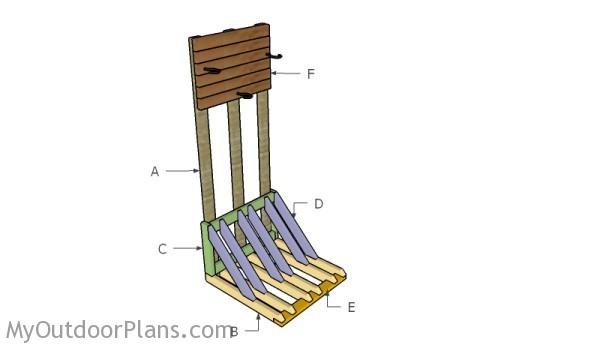
Building a bike rack
Cut & Shopping Lists
- A – 3 pieces of 2×4 lumber – 84″ long LEGS
- B – 6 pieces of 2×4 lumber – 36″ long BASE
- C – 2 pieces of 2×4 lumber – 20″ long, 2 pieces – 30″ long SUPPORTS
- D – 6 pieces of 2×4 lumber – 28 1/2″ long RAILS
- E – 1 piece of 2×4 lumber – 33″ long SUPPORT
- F – 5 pieces of 2×4 lumber – 30″ long PANEL
- 12 pieces of 2×4 lumber – 8′
- 3 bike hooks
- 100 pieces of 2 1/2″ screws
- wood glue, stain/paint
Tools
![]() Hammer, Tape measure, Framing square, Level
Hammer, Tape measure, Framing square, Level
![]() Miter saw, Drill machinery, Screwdriver, Sander
Miter saw, Drill machinery, Screwdriver, Sander
Time
Related
Building a vertical bike rack
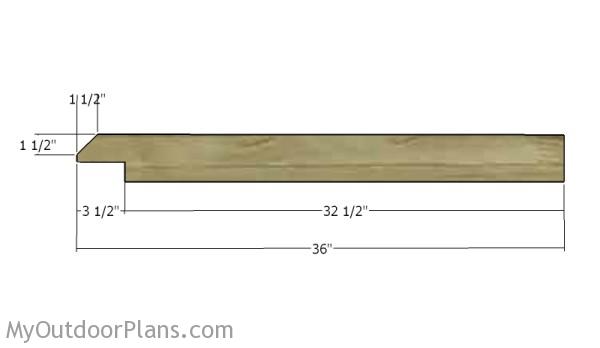
Building the base components
The first step of the project is to build the base components for the bike rack. Mark the cut lines on the 2×4 slats and get the job done with a saw. Smooth the edges with sandpaper for a professional result.
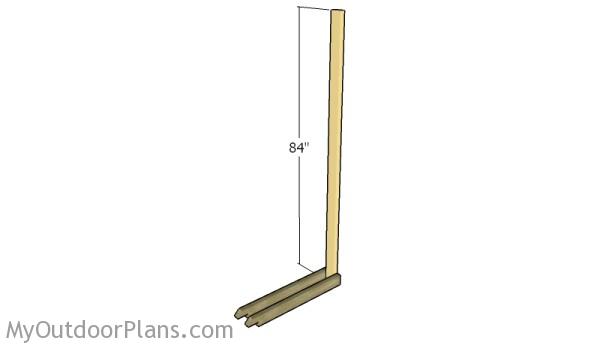
Assembling the rack units
Next, you need to attach the base components to the vertical supports. Drill pilot holes through the base components and insert 2 1/2″ screws into the vertical supports. Make sure the corners are square and leave no gaps between the components.
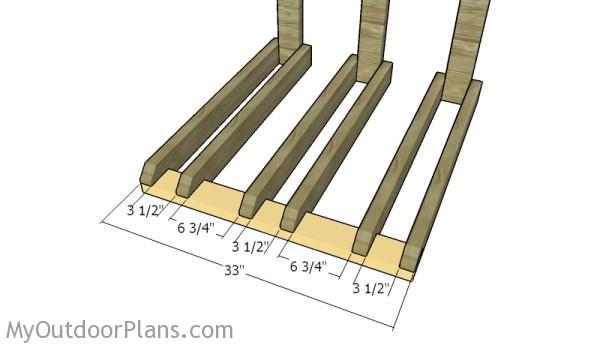
Attaching the front support
Continue the bike rack project by attaching the 2×4 support to the front of the base. Drill pilot holes through the components and insert 2 1/2″ screws to lock them together tightly. Make sure you follow the diagram, so you space the components properly.
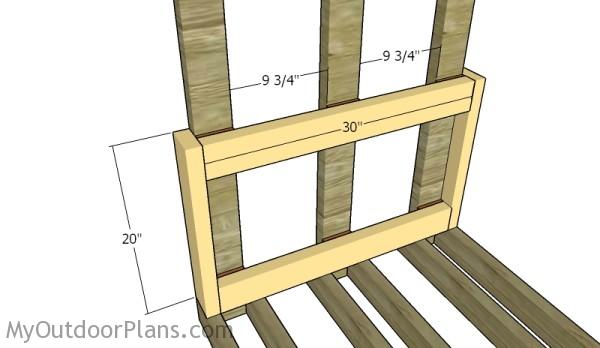
Fitting the supports
Next, attach 2×4 supports to the back of the bike rack. Cut the components at the right dimensions and fit them to the structure. Align the edges, drill pilot holes and insert 2 1/2″ screws.

Fitting the filler pieces
As you can easily notice in the diagram, you need to attach 1/2″ plywood pieces between the vertical supports and the horizontal components, so that you reinforce the rack. Drill pilot holes and insert 2 1/2″ screws.

Building the rails
Next, you need to build the rails from 2×4 lumber. Cut both ends of the rails at 45 degrees.
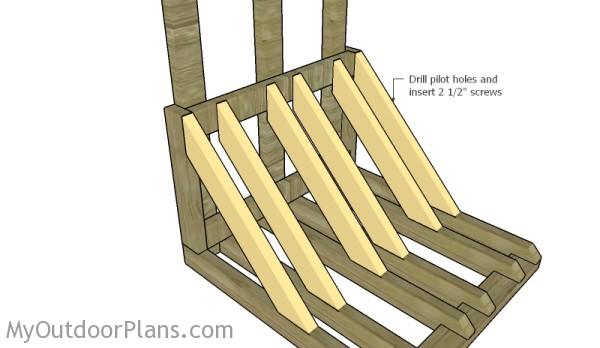
Fit the rails
Fit the rails to the bike rack, making sure the corners are square. Drill pilot holes through the rails and secure them into place with 2 1/2″ screws. Use a spirit level to make sure the vertical supports are plumb.
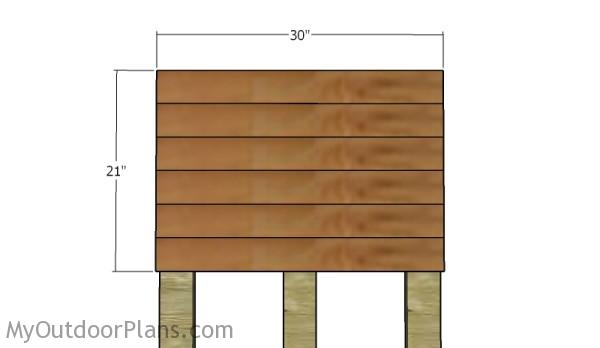
Fitting the top panel slats
Attach 2×4 boards to the top of the vertical supports. Align the edges, drill pilot holes and insert 2 1/2″ screws to lock them into place. Leave no gaps between the components for a professional result.
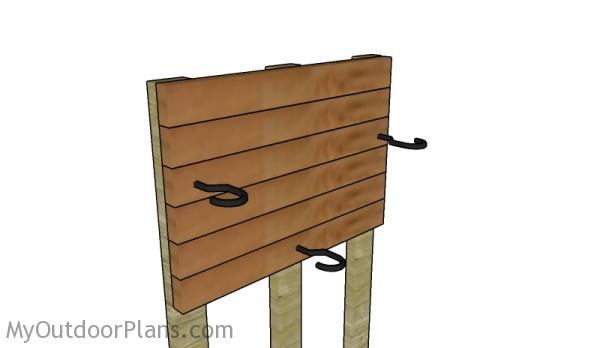
Fit the hooks
One of the last step of the project is to attach the bike hooks to the panel. Adjust the position of the hooks to suit your needs.

Vertical bike rack
Afterwards, all you need to do is take care of the finishing touches and to find a location for the bike rack. If you want to set the rack into place permanently, then you should drive in a few screws through the back supports into the wall. In addition, use bolts to lock the front base support to the floor.
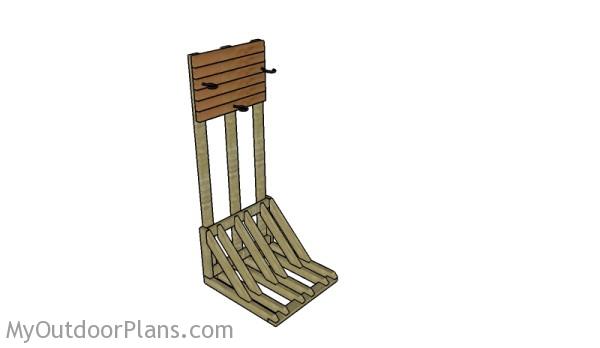
Wall mounted bike rack plans
Fill the holes with wood putty and let them dry out for a few hours. Smooth the surface with 100-220 grit sandpaper and remove the residues with a damp cloth.
Top Tip: Apply a few coats of paint or stain to the components, to enhance the look of the project.
This woodworking project was about vertical bike rack plans free. If you want to see more outdoor plans, check out the rest of our step by step projects and follow the instructions to obtain a professional result.
